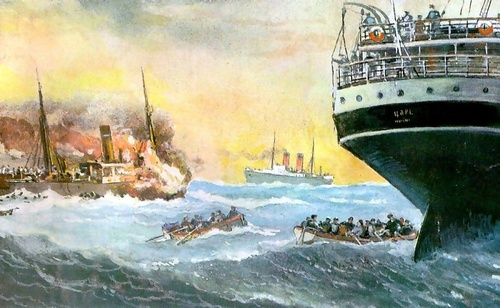
Auction: 18001 - Orders, Decorations and Medals
Lot: 543
Sea Gallantry Medal (Foreign Services), G.V.R., silver (Fritz Meyer, “Volturno”, 9th October 1913), good very fine
Fritz Meyer was the Assistant Purser aboard the German steamer Seydlitz which was constructed in 1902 and build for steerage passenger and freight transfer between Bremen and New York. In October 1913 he found himself involved in one of the most dramatic maritime tragedies of the pre-war years, when the twin screw, triple expansion engine steam ship Volturno caught alight in the North Atlantic, six days out of Rotterdam. The flames were fuelled by a cargo of peat moss, straw covers, hides, rags, oil, celluloid, cotton, wines and luggage, and very quickly they burst through the decks placing the lives of 539 emigrants, 22 cabin passengers and 93 crew at grave danger.
According to R. J. Scarlet's Sea Gallantry Medals:
'Fire at sea is always one of the most terrible calamities, but this is a disaster with many unusual features. Raging flames, hideous boat disasters, superb heroism, and the final dramatic rescue in mid-Atlantic by twelve ships of different nationalities.'
Shortly before 7am the word "Fire" quickly passed from one end of the ship to the other. As soon as Captain Inch heard this, he ordered the ship to be turned round so as to bring the wind aft and take the flames over the bows instead of through the ship. An explosion blew off No. 1 hold, flames shooting as high as the foremast, trapping three men and a boy within the forecastle who thus met a terrible death. Every effort was made to get the fire under control, but it rapidly spread to the bridge, deckhouses and life-rafts, so the Captain therefore ordered the immediate launching of the boats in a heavy swell.
In the rolling waves the lowering gear jammed, nearly tipping all 41 occupants in the first boat overboard. The Chief Officer managed to scramble back on board, but the boat was driven away by the force of the sea and never seen again. The same fate befell the second boat lowered, the third was swamped with all perishing, whilst the fourth was smashed against the ships side with all drowning. Orders were given to cease lowering any more boats.
Five hours later, the first rescue ship, Carmania arrived, followed by Seydlitz. With such a swell, no further boats could launch, so as darkness fell, all that could be done was to place searchlights upon the ship - only to make more clear her desperate plight. At 8.45pm the steam in the Volturno had entirely failed and no longer could the flames be fought. At 9pm the bridge burst into flame and a few minutes later the magazine containing the ship's explosives went up with a deafening roar, with flames seventy feet high. In desperation, Inch gave orders for the passengers to jump into the sea and with many reluctant to do so, he then ordered the crew to set an example and lead the way, either jumping or using life lines down the ships side. It was at this time that the waiting boats and their crews from the rescue ships performed many a heroic deed in saving life, Fritz Meyer included.
According to official records, the rescue boats from Seydlitz saved 29 passengers and 16 crew.
The Board of Trade awarded 152 silver Sea Gallantry Medals (Foreign Services) to officers and men, but interestingly Meyer would not receive his award until 1925 due to the Great War. It hadn't been until 1923 that the Board of Trade found itself wondering whether the German officers and men of the Seydlitz and Grosser Kurfurst had ever received their awards. They appear to have languished in a safe in the British Embassy in Berlin since 1914; sold with a quantity of copied research.
Subject to 20% VAT on Buyer’s Premium. For more information please view Terms and Conditions for Buyers.
Sold for
£380




